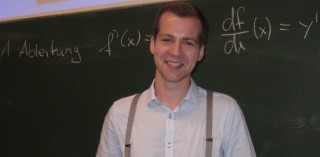Dr. Cornelius Gati has been awarded a long term postdoctoral fellowship by the International Human Frontier Science Program Organization (HFSPO). The CUI scientist from the group of Prof Henry Chapman is one of 75 excellent scientists who have been chosen from 788 applicants originating from 61 different countries.

Only a few days ago, Cornelius Gati defended his doctoral thesis
HFSP postdoctoral fellowships are given to young scientists who wish to broaden their training in a laboratory in another country. Already in a few days, Gati will start at his new workplace in the Laboratory of Molecular Biology (LMB) at the University of Cambridge in England. “The LMB is virtually the birthplace of modern structural biology – starting with X-ray Crystallography 60 years ago and today leading the field of electron microscopy,” Gati says. He is looking forward to meeting a new challenge: “The topic I am working on is ‘single particle cryo electron microscopy’ which means we are calculating models of individual, non-crystalline biomolecules.”
Only a few days ago Gati, who was a member of the CUI and the PIER graduate school, defended his doctoral thesis. From September 2012 until November 2015 he did research in the Coherent Imaging Group led by CUI Professor Henry Chapman (Universität Hamburg, DESY) in the Center for Free-Electron Laser Science (CFEL). “I had a great time which really had a formative influence on me,” Gati says with mixed feelings. Just like Chapman, who has been awarded a Gottfried Wilhelm Leibniz-Preis at the beginning of the year, his new advisor is one the most renowned scientists worldwide: In 2014 the Nature magazine elected Sjors Scheres to be one of the ten most influential scientists. Gati: “At the moment his software ‘RELION’ is the most popular in this field and, moreover, the electron microscopy facility at the LMB is fantastic.” In addition, Gati will be surrounded by excellent structural biologists – for example the 2009 winner of the Nobel Prize in Chemistry, Venki Ramakrishnan.
HFSP fellowships aim at promoting intercontinental collaborations and offer a built in return component: Starting in their second year of tenure, the postdocs can develop plans for setting up their own independent laboratory and then use the third year to move to a new location.

